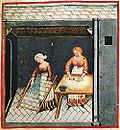Regional cuisines of medieval Europe
Regional Cuisines of Medieval Europe refers to the diverse food habits, cooking methods, and ingredients used across different regions of Europe during the Middle Ages. The period, spanning from the 5th to the 15th century, witnessed significant changes in dietary habits, largely influenced by social, religious, and political factors.
Overview
During the Middle Ages, the diet of Europeans varied greatly depending on region, season, and social status. The majority of the population, particularly the peasantry, subsisted on a diet of bread, porridge, and vegetables. Meat was a luxury, often reserved for the nobility and the wealthy. However, the regional cuisines of medieval Europe were far more diverse and complex than this general overview suggests.
Regional Variations
Northern Europe
In Northern Europe, the diet was heavily influenced by the cold climate and the long winters. The consumption of preserved foods, such as salted fish and smoked meats, was common. Rye was the primary grain used for bread.
Southern Europe
In contrast, the cuisine of Southern Europe was characterized by a greater use of fresh fruits, vegetables, and herbs, largely due to the region's warmer climate. Olive oil was a staple, and wheat was the primary grain.
Eastern Europe
Eastern Europe's cuisine was influenced by both its colder climate and its proximity to Asia. The diet included a lot of dairy products, fermented foods, and grains like millet and buckwheat.
Influence of the Church
The Catholic Church played a significant role in shaping the dietary habits of medieval Europe. The Church's fasting rules, which prohibited the consumption of meat on certain days, led to the increased use of fish and vegetarian ingredients.
Conclusion
The regional cuisines of medieval Europe were diverse and complex, reflecting the social, religious, and environmental factors of the time. They laid the foundation for many of the culinary traditions that continue to define European cuisine today.
This article is a European history–related stub. You can help WikiMD by expanding it!
Transform your life with W8MD's budget GLP-1 injections from $125.
W8MD offers a medical weight loss program to lose weight in Philadelphia. Our physician-supervised medical weight loss provides:
- Most insurances accepted or discounted self-pay rates. We will obtain insurance prior authorizations if needed.
- Generic GLP1 weight loss injections from $125 for the starting dose.
- Also offer prescription weight loss medications including Phentermine, Qsymia, Diethylpropion, Contrave etc.
NYC weight loss doctor appointments
Start your NYC weight loss journey today at our NYC medical weight loss and Philadelphia medical weight loss clinics.
- Call 718-946-5500 to lose weight in NYC or for medical weight loss in Philadelphia 215-676-2334.
- Tags:NYC medical weight loss, Philadelphia lose weight Zepbound NYC, Budget GLP1 weight loss injections, Wegovy Philadelphia, Wegovy NYC, Philadelphia medical weight loss, Brookly weight loss and Wegovy NYC
|
WikiMD's Wellness Encyclopedia |
| Let Food Be Thy Medicine Medicine Thy Food - Hippocrates |
Medical Disclaimer: WikiMD is not a substitute for professional medical advice. The information on WikiMD is provided as an information resource only, may be incorrect, outdated or misleading, and is not to be used or relied on for any diagnostic or treatment purposes. Please consult your health care provider before making any healthcare decisions or for guidance about a specific medical condition. WikiMD expressly disclaims responsibility, and shall have no liability, for any damages, loss, injury, or liability whatsoever suffered as a result of your reliance on the information contained in this site. By visiting this site you agree to the foregoing terms and conditions, which may from time to time be changed or supplemented by WikiMD. If you do not agree to the foregoing terms and conditions, you should not enter or use this site. See full disclaimer.
Credits:Most images are courtesy of Wikimedia commons, and templates, categories Wikipedia, licensed under CC BY SA or similar.
Contributors: Prab R. Tumpati, MD





